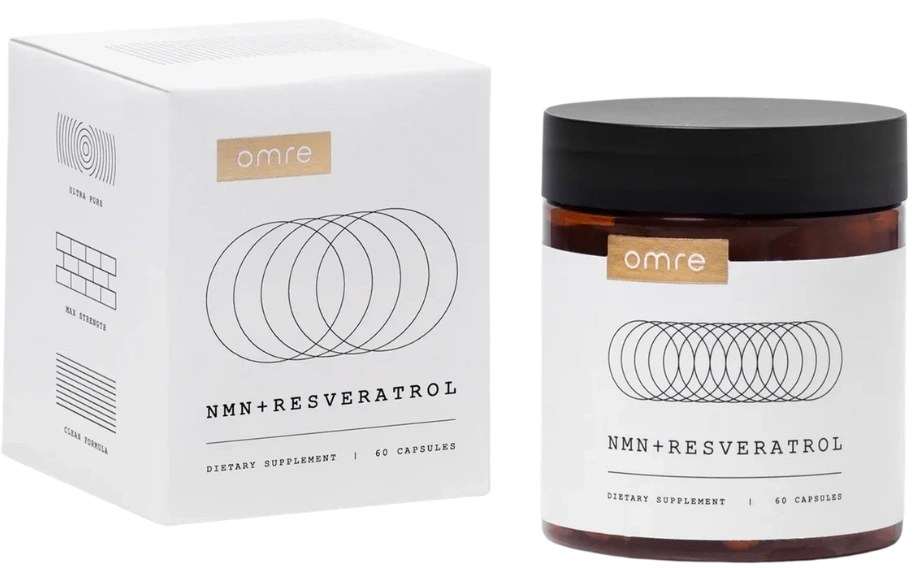Table of Contents
Resveratrol is a naturally occurring compound found in red grapes, grape juice, berries, peanuts, and red wine, and the benefits of resveratrol have been widely studied for their impact on long-term health.
Many people take it because early research shows promising support for heart health, brain function, and healthy aging.
Key Takeaways:
-
Resveratrol is a natural antioxidant that supports heart health and healthy blood pressure.
-
It may help protect the brain by reducing oxidative stress and improving blood flow.
-
Research suggests it may improve insulin sensitivity and support healthy blood glucose.
-
Early studies show potential benefits for joint comfort, healthy aging, and slowing cancer cell growth.
Disclaimer: This content is for educational purposes only and is not medical advice. Always speak with a healthcare professional before starting any new supplement.
NMN + RESVERATROL
Cellular NAD+ booster with ultra‑pure NMN and Resveratrol, at research‑backed doses.*
What Is Resveratrol?
 Resveratrol is a plant compound that works as a potent antioxidant. It is found mostly in the skin and seeds of red grapes and some berries (1).
Resveratrol is a plant compound that works as a potent antioxidant. It is found mostly in the skin and seeds of red grapes and some berries (1).
People often hear about it because moderate wine consumption contains small amounts of resveratrol, although supplements offer much higher doses than food alone.
It is produced by plants as a protective compound against stress and fungal attacks. This same protective role is part of why researchers believe resveratrol protects human cells from oxidative stress.
Much of the early research comes from animal and human studies that used higher doses of resveratrol supplements, which is why results from food sources do not always match the outcomes seen in clinical trials.
Even though food gives only small amounts, regular intake through berries and grape products still adds antioxidant support.
Supplements simply allow researchers to study stronger and more consistent levels to see how the compound affects blood pressure, cholesterol, insulin sensitivity, and cancer cell growth.
How Resveratrol Works in the Body
Resveratrol acts on several pathways in the body, which is why it shows up in research on heart disease, diabetes treatment, brain health, and aging.
It works mainly through three actions:
It reduces oxidative stress by neutralizing reactive oxygen species.
It supports antioxidant enzymes that protect cells from damage.
It influences gene expression, including pathways related to inflammation and cell survival.
Many studies show that resveratrol activates proteins like AMPK, which help the body handle glucose more efficiently (2).
Some research also suggests that resveratrol activates transcription factors and may influence SIRT1, a gene connected to healthy aging.
These effects may explain why resveratrol protects blood vessels, improves mitochondrial function, and shows early potential in cancer prevention.
What Are the Benefits of Resveratrol?
-v1763500798910.webp) Resveratrol may support the heart, brain, metabolism, and overall healthy aging. Below are the main benefits backed by current research.
Resveratrol may support the heart, brain, metabolism, and overall healthy aging. Below are the main benefits backed by current research.
1. Resveratrol May Help Lower Blood Pressure
Resveratrol supplements show promise for lowering high blood pressure due to their strong antioxidant properties.
A 2015 review reported that higher doses helped reduce the pressure exerted on artery walls during each heartbeat (3). This type of pressure is known as systolic blood pressure, and it becomes more common with age as arteries stiffen.
Researchers believe the main reason for this benefit is the increase in nitric oxide (4). This natural compound helps blood vessels relax, which supports better blood flow and reduced strain on the heart.
Several human studies noted improvement, although scientists say more research is needed to define the best long-term dose.
This makes resveratrol a helpful option for people looking to support heart health, especially when combined with healthy lifestyle habits such as exercise and balanced eating.
2. It May Support Healthy Cholesterol and Blood Fats
Animal and human studies both point to resveratrol’s impact on cholesterol.
A mouse study in 2016 found that resveratrol supplementation lowered total cholesterol, improved HDL cholesterol, and reduced body weight (8).
These effects come from how resveratrol reduces the action of an enzyme that helps produce cholesterol inside the liver.
Another study in people used grape extract enriched with resveratrol. After six months, LDL cholesterol dropped by 4.5 percent, and oxidized LDL dropped by 20 percent (9).
Oxidized LDL contributes to plaque buildup inside artery walls, which raises the risk of cardiovascular diseases.
This antioxidant effect helps protect blood vessels from damage caused by lipid oxidation.
While results vary, these findings show clear potential for supporting healthy blood fats and slowing early cardiovascular disease risk factors.
3. It Shows Longevity Benefits in Animal Studies
Resveratrol has been studied for its role in aging because it appears to activate genes involved in cell survival and stress resistance. One review found that resveratrol increased lifespan in 60 percent of the organisms studied, especially in worms and fish (13).
It works in ways similar to calorie restriction, which is known to change how genes express themselves and improve mitochondrial function.
These pathways are linked to slower aging in animal research. Human studies are limited, and scientists are still exploring how resveratrol metabolites behave in the body.
Although early results are interesting, resveratrol is not proven to extend lifespan in people. Still, its effects on oxidative stress and cell protection make it a common topic in longevity research.
4. May Support Brain Health and Cognitive Function
Several studies suggest that drinking red wine and consuming resveratrol may support brain health with age (5).
The compound helps protect brain cells from oxidative damage and may slow the buildup of beta amyloid proteins connected to Alzheimer’s disease (6).
Research has also shown that resveratrol increases blood flow to the brain and improves how brain cells use glucose for energy (7).
One study reported that these effects may slow early cognitive decline. By reducing inflammation and oxidative stress, resveratrol protects delicate brain cells from damage linked to chronic diseases.
Scientists still study how well the body absorbs resveratrol supplements, but current research shows clear biological mechanisms that support long-term brain function.
5. May Improve Insulin Sensitivity and Blood Sugar Control
Resveratrol appears promising for people with insulin resistance or type 2 diabetes. In animal studies, it increased insulin sensitivity, reduced oxidative stress, and activated AMPK, a protein that helps lower blood glucose (10).
It also reduced sorbitol buildup, which protects cells from oxidative damage.
Human studies show mixed results but still offer insight. In one study, participants taking 150 milligrams daily for six months had lower A1C levels compared to a placebo group (11).
Other research found that higher doses from 500 to 3,000 milligrams were needed to improve fasting blood glucose and insulin sensitivity (12).
These findings show potential for diabetes management, although lifestyle factors such as diet, sleep, and exercise still play a major role.
NMN + RESVERATROL
Cellular NAD+ booster with ultra‑pure NMN and Resveratrol, at research‑backed doses.*
6. May Help With Joint Pain and Inflammation
Resveratrol supports joint health through its anti-inflammatory and antioxidant properties. It reduces inflammatory markers like COX enzymes, which are linked to joint pain and swelling.
A study in rabbits found that injecting resveratrol directly into arthritic joints helped protect cartilage from breaking down (14).
Other studies in animals and test tubes show reduced inflammation and better joint protection from oxidative stress.
Because cartilage breakdown causes stiffness and pain, resveratrol may be helpful for people with mild joint concerns.
Human studies are still limited, but the early evidence is promising.
7. May Help Slow Cancer Cell Growth
Resveratrol has been widely studied for its anticancer properties. In lab and animal studies, it inhibits cancer cell growth, induces apoptosis, and blocks signaling pathways that allow tumor cells to spread (15, 16).
Research has shown activity against breast cancer, colon cancer, prostate cancer, skin cancer, and ovarian cancer (17).
It may change gene expression in a way that slows cell proliferation and increases cancer cell death. Some studies also report hormonal effects that may help slow hormone-sensitive tumors.
Human studies remain inconsistent, with some showing benefit and others showing no effect.
Even so, researchers continue exploring resveratrol as part of cancer prevention and supportive care in controlled settings.
8. May Support Healthy Body Weight
Animal studies show that resveratrol reduces fat cell formation, prevents fat storage, and activates AMPK for better energy metabolism (18).
A review reported that resveratrol significantly reduced body weight in many trials.
However, human studies show mixed outcomes. Some people see improvement in insulin sensitivity and fat mass, while others see little change in body weight.
Because weight loss involves diet, exercise, sleep, and hormones, resveratrol works best as a complementary tool, not a standalone weight loss program.
Is Resveratrol Safe?
Current research shows that resveratrol supplements are generally safe for healthy adults. Most studies report good tolerance, even at higher doses (19).
The main challenge is that there is no clear guidance on how much resveratrol a person should take to get the best results, since different studies use very different amounts.
There are a few cautions to keep in mind. High doses have been shown in test tubes to slow blood clotting, which means resveratrol may increase the risk of bleeding when combined with blood thinners, anti-clotting drugs, or some pain relievers (20).
If you take prescription medication, it is best to speak with your doctor before adding resveratrol.
Resveratrol Dosage and How to Take It
 There is no official daily recommendation for resveratrol. Studies have used a wide range of doses, from 150 milligrams per day up to several grams (21).
There is no official daily recommendation for resveratrol. Studies have used a wide range of doses, from 150 milligrams per day up to several grams (21).
Most people fall somewhere in the lower to mid range because it is easier to tolerate and still aligns with the doses used in many health-related trials.
Some helpful notes based on available research:
Oral resveratrol from 250 to 1,000 milligrams per day has been used safely for several weeks or months.
Higher doses from 1,500 to 3,000 milligrams may cause stomach discomfort in some people.
Resveratrol seems to absorb better when taken without a high-fat meal.
Many studies on heart health, blood pressure, and insulin sensitivity used daily dosing for at least three months.
Supplements vary widely in strength and purity, so choosing a product that is third-party tested can help you avoid fillers and inconsistent labels.
If you are new to resveratrol, starting with a lower dose and gradually increasing makes it easier to see how your body responds.
Final Words
Resveratrol is a naturally occurring compound with a growing body of research behind it. Studies show promising benefits for heart health, brain function, blood sugar control, joint support, and healthy aging.
It also has strong antioxidant and anti-inflammatory effects, which play a role in how it protects cells from oxidative stress and inflammation. While most findings are early and often come from animal work, human studies point in a helpful direction.
Because dosage guidelines are not fully defined and absorption varies, it makes sense to take a balanced approach. Enjoying resveratrol-rich foods and choosing a clean, well-tested supplement can offer steady support without going overboard.
If you take medications or have ongoing health conditions, checking with a doctor is always a wise step. If you want steady support for energy, healthy aging, and cellular protection, you may like our Omre NMN + Resveratrol formula. It pairs two well-studied ingredients that work together to support vitality in a simple daily routine.
If you want steady support for energy, healthy aging, and cellular protection, you may like our Omre NMN + Resveratrol formula. It pairs two well-studied ingredients that work together to support vitality in a simple daily routine.
FAQs
Does red wine offer enough resveratrol to see benefits?
Red wine contains only small amounts of resveratrol, far below the levels used in most studies. A person would need to drink unrealistic amounts of wine to match the doses seen in research, so supplements or food sources like grapes and berries are more practical.
How long does resveratrol take to work?
Most studies show changes after several weeks to three months of consistent use. The timeline depends on the health area being studied, the dose, and how well the body absorbs the supplement.
Can you take it daily?
Yes, daily use is common in research, especially in studies on heart health, blood pressure, and blood glucose. Most people tolerate daily dosing well, as long as the amount is not extremely high.
Is it safe for long-term use?
Short and mid-term studies show good safety, and many people take it for several months at a time. Long-term data is still limited, so it is wise to choose moderate doses and review with a doctor if you use it for extended periods.
What foods contain resveratrol?
Natural sources include red grapes, grape juice, berries, peanuts, and red wine. Dark chocolate also contains small amounts. Food sources offer added nutrients and antioxidants, although the resveratrol levels are much lower than supplement doses.





